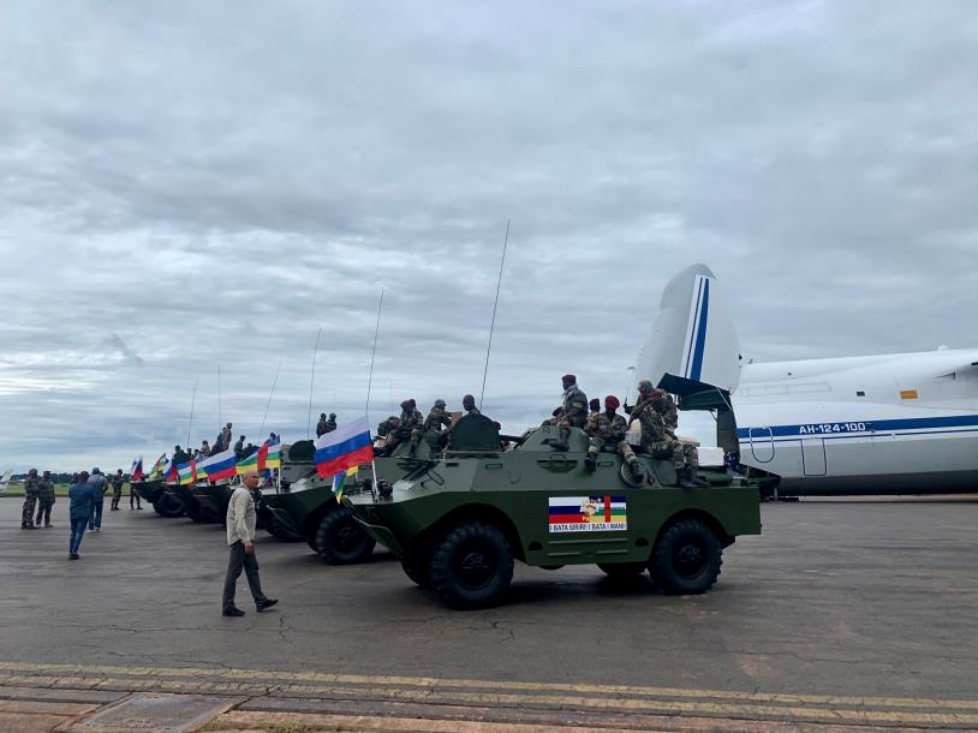
The arrival of Russian military equipment, including these BRDM-2 armored vehicles, along with members of the Wagner Group helped prevent a rebel army from taking the Central African Republic’s capital in 2021.
“If no one else can provide it, African countries may continue to turn to the likes of Wagner…”
In 2021, Russia’s Wagner Group, a Kremlin-linked private military force, made a significant difference in the Central African Republic (CAR) when somewhere between 1,200 and 2,000 of its mercenaries, aided by 300 Rwandan soldiers, prevented rebels from capturing CAR’s capital, Bangui. Wagner’s success was initially lauded by much of CAR’s populace, but as the accompanying excerpted article from South African Institute for Security Studies notes, those feelings of appreciation for restoring security have morphed into anger as Wagner has been accused of human rights abuses against civilians. As the article states, Wagner has a mixed record in several African nations, including Libya, Sudan, and Mozambique.
In addition to the Wagner Group’s human rights record, people are asking questions about how the organization is paid. As the article notes, no one has seen a contract between Wagner and CAR, leading to allegations that lucrative mining deals are the paramilitary force’s method of payment. Further muddying the waters is the government of Mali, which denies the presence of the Wagner Group, claiming instead that it only has Russian instructors on its soil. Perhaps unsurprisingly, the Wagner Group does not care that it is supporting undemocratic regimes. This is particularly obvious in Mali, where Wagner did not arrive until after Colonel Assimi Goïta’s coup. Still, as the article points out, despite the anguish of Western countries over Wagner’s involvement in Africa and the backlash of some African nations over the deplorable human rights abuses committed by the organization, there is grudging acceptance that in some beleaguered nations, Wagner has helped stabilize the situation by driving off terrorists.
Source:
Peter Fabricius, “Wagner’s Dubious Operatics in CAR and beyond, Institute for Security Studies (South African think tank), 21 Jan 2022. https://issafrica.org/iss-today/wagners-dubious-operatics-in-car-and-beyond
Russia has established a strong military presence in the Central African Republic (CAR) over the past four years, clandestinely using dubious actors like the military company Wagner, which is allegedly close to President Vladimir Putin. Wagner has become the deniable vanguard of a major Russian push into Africa, many analysts believe.
France has threatened to completely withdraw military support to Mali. Sweden has already announced its exit from the European force Takuba because of Wagner’s arrival. Such decisions are difficult because they may further weaken the fight against the common enemy – violent extremism.
But Wagner’s growing presence on the continent also poses some difficult questions to the international community, including the West. The problem is not only about democracy but also stability and security. If no one else can provide it, African countries may continue to turn to the likes of Wagner – though it’s too soon to judge its overall effectiveness either.
He says complicating any analysis or comparison is that Russia’s involvement in the CAR and elsewhere in Africa is probably more covert, so it’s hard to know just where it is and what it’s doing. (There are rumours that Russia has its eyes on Burkina Faso, for example.)
Image Information:
Image: The arrival of Russian military equipment, including these BRDM-2 armored vehicles, along with members of the Wagner Group helped prevent a rebel army from taking the Central African Republic’s capital in 2021.
Source: UN Security Council/Wikimedia Commons, https://commons.wikimedia.org/wiki/File:RussiansinBangui.png
Attribution: Public Domain
